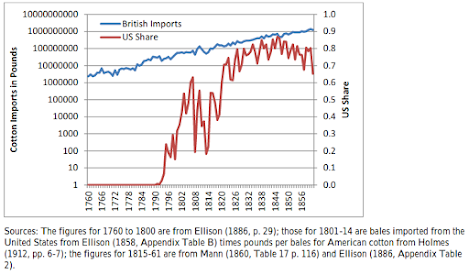Recently the children and grandchildren of ex-colonials who work for the BBC etc. have been getting a major attack of conscience about the British Empire. Most of us just regard the old Empire as something that ended in or before the days of our grandparents but if you have family that returned from the colonies or were expelled from the colonies you might feel guilty.
How much did the British Empire benefit the British? We should be sceptical
 |
| Wikipedia:Great Divergence |
about the economic impact of Empire because the rapid growth in British incomes relative to our European neighbours began before the huge expansion of Empire in the nineteenth century. The British domestic economy was making the British rich so how did Empire help?
Traditionally it is assumed that imperial trade provided a huge boost to the UK economy. Overseas trade requires that in the long run it is balanced. The customers must have enough money to buy goods and services and the producers must have the resources and capital to produce them. As part of this equilibrium the wholesalers, retailers and other middlemen must benefit equally at both ends of the trading. The scope for big profit lies in the local producers or middlemen being able to extort labour or goods from their locality and in the days of maritime empires this usually entailed living abroad as a colonist. Being a colonist made some entrepreneurial people very wealthy, they received the "huge boost" of empires and much of that boost remained overseas.
The classic picture of imperial trade is that the UK produced manufactured goods in return for raw materials. However, in the nineteenth century much of the raw materials for manufactures, such as coal, iron, copper, tin etc. were produced in the UK. The raw materials obtained from the Empire were cotton, sugar, tobacco and wood. Of these cotton was by far the most important, in around 1825 processed cotton goods were about 40% of UK exports whilst imports of sugar etc added together were of relatively low value.
However, much of British cotton (70% to 90%) was imported from the USA:
 |
| Source: Olmstead AL and Rhode, PW. (2016) |
The USA was not part of the British Empire after 1776. The rise in British cotton imports from India was a result of the American Civil War as can be seen from the massive fall in imports from the USA in 1862:
 |
| Source: Surdam |
Indian cotton was about 35% of cotton imports in 1870 as US supply rapidly returned.
There is no doubt that Britain was a major trading power in the nineteenth century:
If we remove the seventy percent or more of British trade that went outside the empire we are left with perhaps 20-30% of trade within it.
This confirms that having an Empire was a fairly pointless exercise throughout the nineteenth century from the viewpoint of trade. Much of the "Empire Share" of trade would probably have been available without an empire. Why did Britain have an empire?
The Empire began as a mixture of the seizure of the overseas possessions of other European powers in the wars of the eighteenth century and the entrepreneurial activity of bodies such as the East India Company. These new possessions were colonised and the Empire then became an exercise in protecting the colonists. Much of the apparently large wealth of the British Empire was in fact the wealth of the colonists.
Why did Britain have an Empire? Another answer to that question is that, as in all other commercial activities, it makes some entrepreneurial people wealthy. Some of the British people who went overseas, colonising and trading, got richer than they could have expected at home. Some of their descendants then got kicked out of the colonies, came back to the UK, and joined the BBC to lecture us on the evils of the old Empire as if it still existed.
The colonists who stayed overseas turned out to be a huge boon to the world. Without them we would be speaking German.
See also Slavery and British Wealth in the 18th and 19th Centuries
7/10/2020
Olmstead, AL and Rhode, PW. (2016) Cotton, Slavery, and the New History of Capitalism.
Surdam, David G. “King Cotton: Monarch or Pretender? The State of the Market for Raw Cotton on the Eve of the American Civil War.” The Economic History Review, vol. 51, no. 1, 1998, pp. 113–132.
McKeown TJ (1983). Hegemonic Stability Theory and Nineteenth-Century Tariff Levels in Europe. International Organization · February 1983



Comments